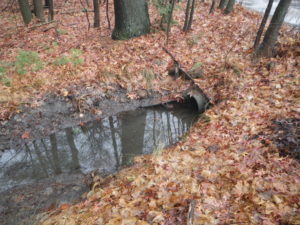The long-anticipated 2016 Massachusetts Small MS4 General Permit, which replaces the 2003 Small MS4 General Permit, was finally signed on April 4, 2016 and jointly issued by the U.S. EPA and MassDEP on April 13, 2016, with an effective date of July 1, 2018. While this date may seem a long way off, it actually affords municipalities limited time to efficiently and effectively determine Massachusetts MS4 compliance needs.
The Time to Plan is Now
 In addition to the six Minimum Control Measures included in the original 2003 Permit, the 2016 Massachusetts MS4 General Permit also specifically includes limits to Total Maximum Daily Loads (TMDLs). TMDLs set pollution limits for affected waterways. These pollution limits represent the maximum amount of pollutant a specific body of water can handle before marine life, wildlife, and/or recreational uses become adversely affected. Because stormwater has the potential to have a significantly negative impact on waterways, TMDLs are a necessary protection measure. Unfortunately, addressing stormwater contributions to TMDLs will require that many communities make some structural and treatment modifications to their stormwater systems, and these take both time and money.
In addition to the six Minimum Control Measures included in the original 2003 Permit, the 2016 Massachusetts MS4 General Permit also specifically includes limits to Total Maximum Daily Loads (TMDLs). TMDLs set pollution limits for affected waterways. These pollution limits represent the maximum amount of pollutant a specific body of water can handle before marine life, wildlife, and/or recreational uses become adversely affected. Because stormwater has the potential to have a significantly negative impact on waterways, TMDLs are a necessary protection measure. Unfortunately, addressing stormwater contributions to TMDLs will require that many communities make some structural and treatment modifications to their stormwater systems, and these take both time and money.
A Notice of Intent (NOI) to apply for coverage under the Permit must be filed to the Massachusetts Department of Environmental Protection (MassDEP) by September 29, 2018. The Permit is expected to increase municipalities’ stormwater costs substantially for the duration of the permit term — an increase that simply may not seem affordable to some communities. And, non-compliance is not an option as it brings with it its own costs including the potential for regulatory action and fines.
The best course of action to establish compliance with the 2016 Massachusetts Small MS4 General Permit is a proactive, systematic approach. Municipalities should be evaluating current MS4 stormwater measures including stormwater system mapping, best management practices (BMPs), illicit discharge monitoring and elimination, etc., and assessing whether or not they are still in compliance with the new Permit. In addition, municipal stormwater systems should be carefully evaluated for cost-efficient and effective means of becoming fully compliant as well as provided with a proposed 5-year budget for compliance. In this way, small MS4 stormwater systems can approach local government officials with a clear and defendable stormwater budget so that nobody is caught unprepared..
 Fortunately, stormwater assessments that are conducted by licensed professional engineers, such as Tata & Howard’s MS4 Compliance Assessments, provide a significant return on investment. As part of the assessment, the entire system is meticulously evaluated for the most budget-conscious ways in which to fully meet compliance. Permit exclusions will also be assessed and all previous stormwater work will be documented to establish proper credit. The assessment also provides a well-planned course of action that is defendable when justifying projects and procuring funding.
Fortunately, stormwater assessments that are conducted by licensed professional engineers, such as Tata & Howard’s MS4 Compliance Assessments, provide a significant return on investment. As part of the assessment, the entire system is meticulously evaluated for the most budget-conscious ways in which to fully meet compliance. Permit exclusions will also be assessed and all previous stormwater work will be documented to establish proper credit. The assessment also provides a well-planned course of action that is defendable when justifying projects and procuring funding.
Key Dates:
- July 1, 2018: Revised MS4 Permit effective date
- September 29, 2018: Notice of Intent (NOI) to apply for coverage under the permit due to EPA/MassDEP (90 days from effective permit date)
- July 1, 2019: 5-year Stormwater Management Plan (SMP) must be posted publically (one year from the effective permit date)
While the 2016 Massachusetts Small MS4 General Permit has received critical attention and is likely to increase municipalities’ stormwater costs, it is also likely to significantly increase protection to the Commonwealth’s waterways. The fact also remains that the revised MS4 Permit has already been signed and issued. Therefore, finding a balance between compliance and budgetary constraints must be a priority for all MS4 communities.

Jon Gregory, P.E., Tata & Howard’s Stormwater Manager, has dedicated his career to water environment engineering consulting and has over 18 years of experience in the design, permitting, and construction of water related projects. He is currently working on numerous stormwater projects throughout Massachusetts including assisting communities with MS4 compliance.


